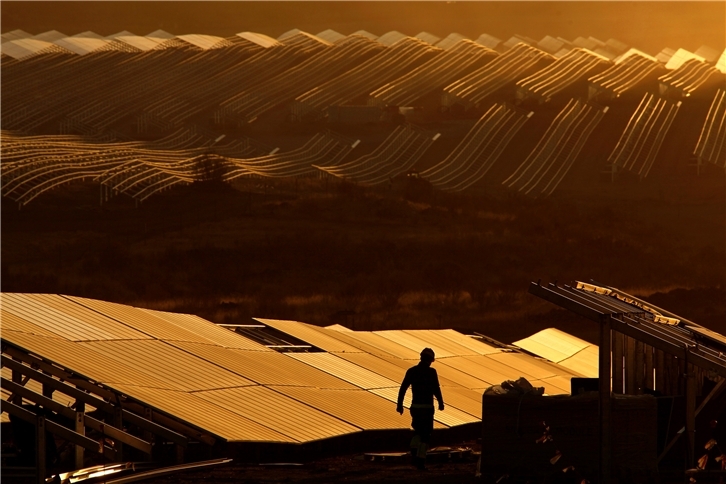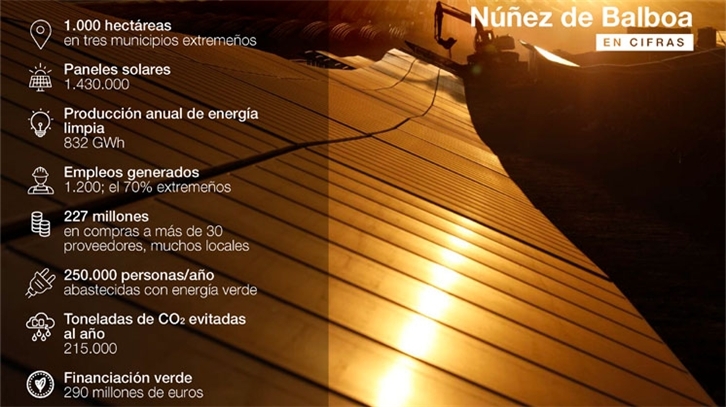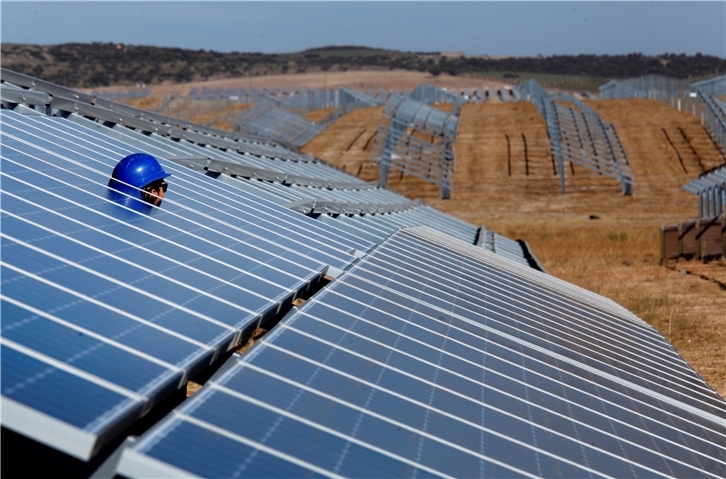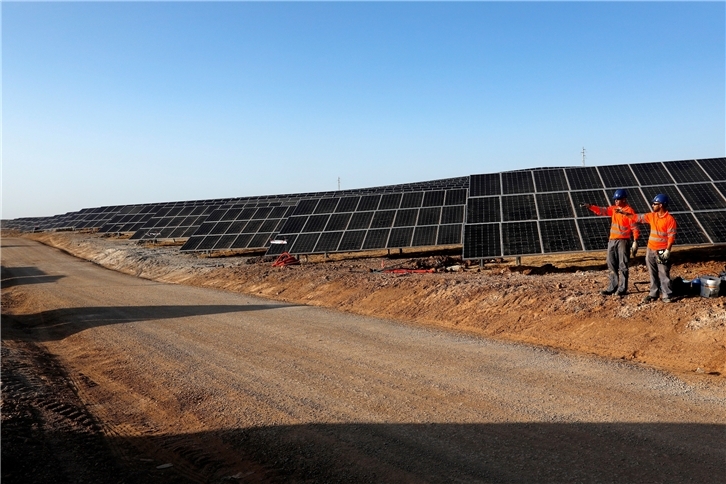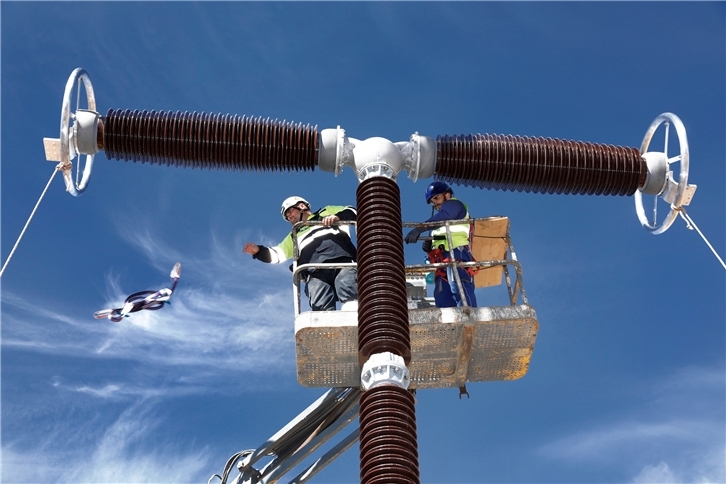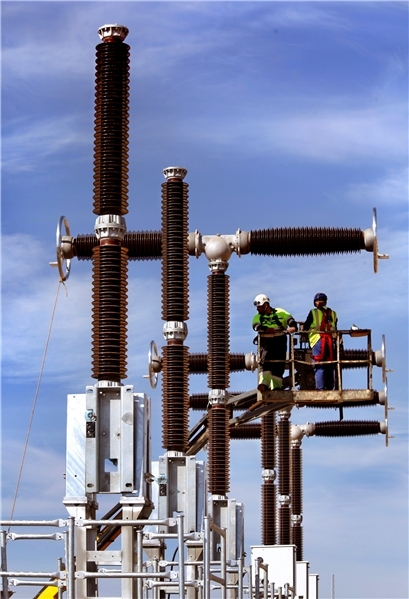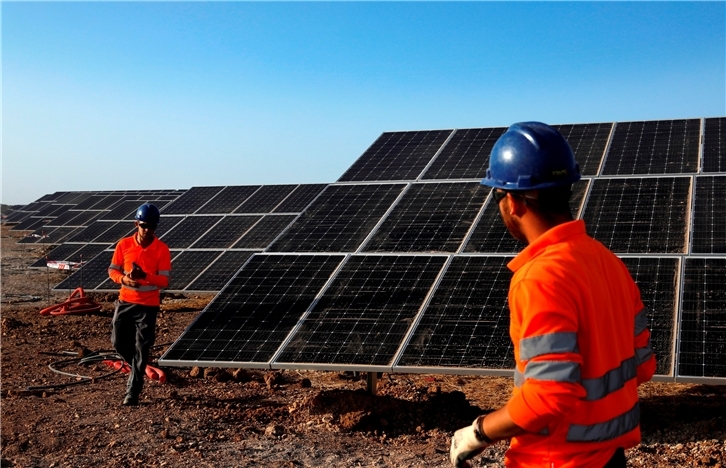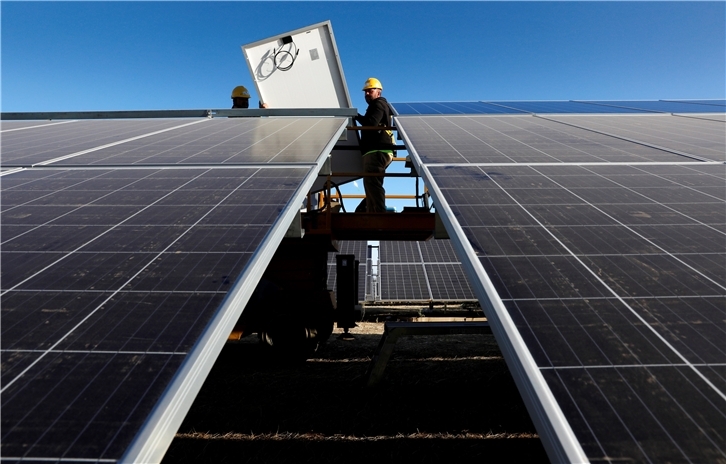News
The company has placed Extremadura as the centre of its renewables strategy in Spain
Núñez de Balboa completed: Iberdrola finalizes the construction of the largest photovoltaic plant in Europe within one year
- Permission received for start-up and energisation tests have begun with a view to going into production in the first quarter of 2020
- A flagship project integrating millions of components, coordinating hundreds of tasks, contributing to employment in the region and revitalising its industrial fabric, supplying green energy, featuring bilateral agreements with major consumers, and funded by green financing
- Iberdrola's plan to relaunch clean energies in Spain includes installation of 3,000 MW of renewable energy by 2022
Europe's biggest photovoltaic plant has already been finalized. Iberdrola has completed in record time, in just one year, construction of the Núñez de Balboa project, which recently obtained its commissioning permit from the Ministry for Ecological Transition and for which Red Eléctrica de España (REE), the national grid, has started energisation tests. Based on these processes, the plant is forecast to start operations in the first quarter of 2020.
With the completion of Núñez de Balboa, with an installed capacity of 500 megawatts (MW) and an investment of nearly 300 million euros, Iberdrola moves forward in its plan to relaunch green energy in Spain, which envisages the installation of 3,000 MW by 2022, with Extremadura at the centre of its strategy.
Núñez de Balboa extends over an area of some 1,000 hectares (2,470 acres) straddling the municipalities of Usagre, Hinojosa del Valle and Bienvenida in the province of Badajoz. The plant, promoted in collaboration with Ecoenergías del Guadiana, is a flagship renewable project that has broken records:
- Millions of components: with the installation of 1,430,000 solar panels,115 inverters and two substations involving delivery of a total of 3,200 containers. See more here
- Job creation: it requires more than 1,200 employees during peak-work periods; 70% of them from Extremadura; See more here
- Revitalising the industrial fabric: its construction has contributed to the development of the value chain, with purchases from some thirty suppliers, many of them local, worth 227 million euros. See more here
- Action against climate change: the plant will generate clean energy to supply the needs of 250,000 people a year - equivalent to the populations of Cáceres and Badajoz combined - and will avoid the emission of 215,000 metric tons of CO2 into the atmosphere per year. See more here
- Project funded by green financing: for its development, Iberdrola received green financing from the European Investment Bank (EIB) and the Instituto de Crédito Oficial (ICO), Spain's state financial agency. See more here
- Promoting sustainable consumption: A pioneer in Spain, with long-term Power Purchase Agreements (PPAs) in place, the project will supply clean energy to major clients committed to sustainable consumption in the banking, telecommunications and retail sectors.
- Education and training on renewables: Iberdrola and the Municipalities of Usagre and Llerena are working together on training students of the Campiña Sur Vocational School in Extremadura, with educational site visits and practical plant experience. See more here
Another 1,300 MW in renewables in the pipeline in Extremadura
Iberdrola has placed Extremadura at the centre of its renewable strategy in Spain, where it plans to install more than 2,000 MW of photovoltaic energy by 2022.
In addition to Núñez de Balboa (500 MW), the company has more than 1,300 MW in renewables in six pipeline photovoltaic projects: Francisco Pizarro (590 MW), located in Torrecillas de la Tiesa; Ceclavín (328 MW), in Alcántara; Arenales (150 MW), in Cáceres; Campo Arañuelo I, II and III (150 MW), in the district of Almaraz; and Majada Alata and San Antonio (50 MW each), in Cedillo. Furthermore it has 300 MW grid access available with which to plan another photovoltaic project.
Thanks to the regional administration’s agility in processing renewable projects, construction of the next plant, the Campo Arañuelo complex (Arañuelo I, II and III), with 150 MW, will be able to start in early 2020. This development, which could create another 200 jobs during its construction. has a high level of local involvement, the engineering and environmental works having been awarded to Badajoz-based Ecoenergías del Guadiana and the power transformers being supplied by Faramax, of Cáceres. The project also includes an energy storage system involving the use of an innovative battery.
Plan to relaunch clean energy in Spain
Iberdrola's plan to invest in renewable energies in Spain includes the installation of 3,000 new MW by 2022. By 2030, company forecasts point to the installation of 10,000 new MW. These actions will enable jobs to be created for 20,000 people.
Currently, the company's projects in construction and at the detail design stage - wind and photovoltaic - amount to more than 4,000 MW in Extremadura, Castilla-La Mancha, Castilla y León, Navarre, Aragon, Murcia, Cantabria and Andalusia.
In Spain, Iberdrola is the leader in renewable energies, with an installed capacity of 16,000 MW (over 30,300 MW worldwide), making its generation facilities some of the cleanest in the energy sector.
Iberdrola's commitment to a decarbonised economic model has led it to earmark 10 billion euros a year for investment in renewable energies, smart electricity distribution networks and storage technologies, on top of the 100 billion already invested since 2001.







